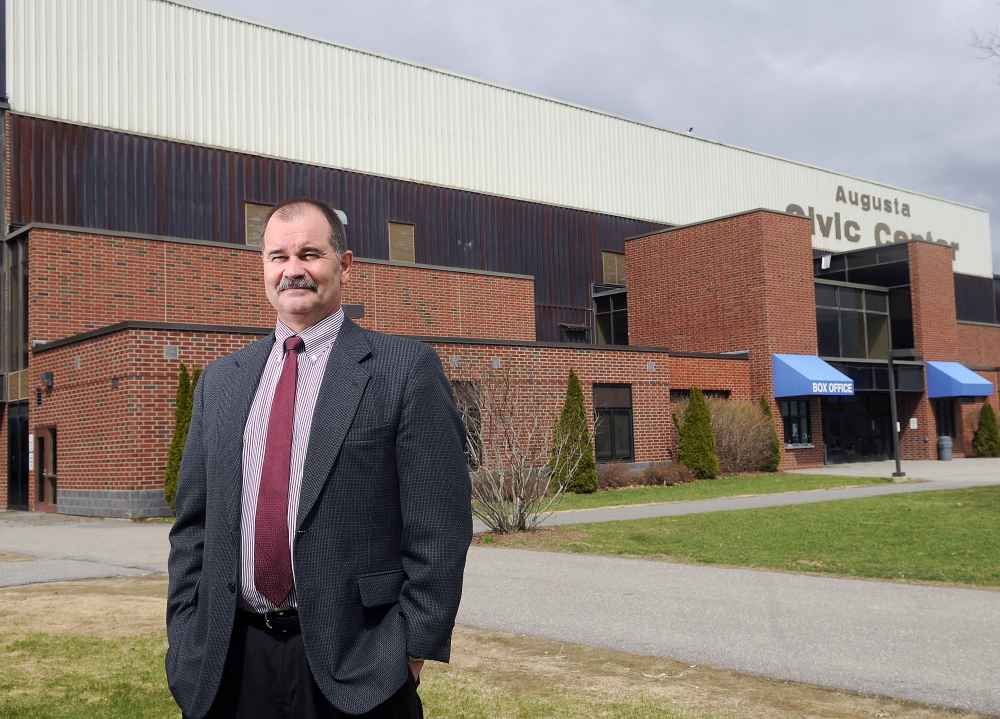AUGUSTA — Four years ago Dana Colwill, director of the Augusta Civic Center, was driving to work one day when an advertisement came on the radio for tickets to an Alan Jackson concert in Bangor. That would have been fine, were it not taking place the very same date the popular country crooner was tentatively scheduled to play in Augusta.
Colwill called the tour’s promoter and learned Jackson was spurning Augusta to play that date instead at the Bangor Waterfront outdoor concert facility, which now can take in up to 16,000 fans, compared to the 6,000-fan capacity at the Augusta Civic Center.
Was that loss of the Jackson show the beginning of the end for big-time concerts in Augusta?
Colwill and many others hope not, but they fear the city-owned auditorium and conference center just off Interstate 95 in Augusta can’t compete for major concert acts with its newer, larger, more well-connected competition in Bangor.
“That’s when our summer concerts started vanishing,” Colwill said of the 2010 opening of the privately promoted concert facility in a city-owned park in Bangor, since renamed Darling’s Waterfront Pavilion.
Most of Augusta’s major winter concert business has repeated that vanishing act, after the 8,000-seat Cross Insurance Center opened in Bangor in 2013.
“Bangor, their niche right now is the concert industry, and that’s hurting us,” Colwill said. “The waterfront, once it was developed, can hold 16,000 people. We can’t compete with that, with 6,000 seats. The Cross Insurance Center holds 8,000. We can’t compete with that. We’ve had some Christian rock shows and Mannheim Steamroller last Christmas, but not the major concerts that draw a lot of attention — all, in my mind, due to the new Bangor facilities.”
He noted that promoters, if they’ve got a show likely to sell out, naturally want to take that act somewhere with the most seats so profit margins will be higher.
WELL-CONNECTED
Colwill said it’s not just the seating that makes it hard to compete with the Cross Insurance Center which, like Augusta, can host concerts year-round. He said Global Spectrum, the firm that manages the Cross Insurance Center for the city of Bangor, is part of Comcast-Spectacor, one of the world’s largest entertainment companies, which has ties to venues across the country. Those ties, Colwill said, allow the company to book acts that are also booked at other venues with which it’s associated.
“They’re huge,” Colwill said of the company. “So, bottom line, the management company in Bangor has got all these contacts and resources which, as just some guy in Maine, I don’t have.”
But that doesn’t mean the current time, or even the financial future, is bleak for the Augusta Civic Center. Quite the opposite, Colwill and other city officials said.
That’s because the 42-year-old city-owned facility’s real niche is conventions, banquets and trade shows, which account for about 90 percent of its business.
That business has allowed the building, over the last 10 years, to roughly break even, which officials said is better than most similar municipal-owned facilities do.
The civic center’s annual budget, proposed to be $2.6 million next year, is determined by projecting what it is expected to bring in for revenue for the year, and then budgeting expenses at that same amount.
“We’ve got to match our expenses up to our revenues, because right now the city doesn’t have the money to subsidize us to any great degree,” Colwill said.
Last year, however, the civic center brought in $163,000 less in revenue than it had for expenses, when depreciation costs are included. Colwill said it was just a down year, with the lowest revenue in his 11 years as director.
Ralph St. Pierre, finance director and assistant city manager, said the city covers such losses by effectively making a loan to the civic center from the city’s fund balance, and the civic center pays that loan back.
“The 10-year trend is it has basically broken even, but last year it lost $163,000,” St. Pierre said. “The numbers are getting better, but we’re still trying to recover from the recession. We think, over the next few years, they’ll become profitable enough to pay that back.”
IN THE BLACK
Colwill said much of the civic center’s convention business is from repeat customers. He credited the civic center staff’s customer service for that repeat business.
The civic center has 107 employees, 14 of them full-time.
City Manager William Bridgeo said the typical model for municipally owned civic centers is they are subsidized by the municipality that owns them. While the city does front the cost of major capital repairs to the civic center, and covers the cost of expenses in lean years, over 10 years it has broken even. As revenue comes in, the civic center pays the city back the money used to cover losses and capital repairs.
“It’s a credit to Dana and everybody involved with the Augusta Civic Center that we operate in the black,” Bridgeo recently told city councilors during a review of the facility’s proposed budget for the coming year.
Debbie Cyr, finance director for the city of Bangor, said the Cross Insurance Center is just finishing its first full year of operations, so the city doesn’t have firm numbers on whether its revenue will cover expenses; but she said it appears likely it will fall just short of breaking even for the year.
She said Bangor’s proposed budget includes about $3 million in debt service on the loan taken out to build the $65 million Cross Insurance Center, and it is projected to bring in about $2.8 million in revenue next year. She said the city funds the center with proceeds it gets from gaming operations at Hollywood Casino Hotel and Raceway, and a downtown Tax Increment Financing district.
Bridgeo said municipalities often are willing to subsidize operations of such large public facilities because the crowds they draw for events also tend to spend money elsewhere at businesses in the surrounding area.
Though no studies have been done recently, a Thomas College study indicated, about a dozen years ago, that the economic effect of the Augusta Civic Center on the local economy was about $25 million a year, according to Colwill. That comes from attendees at civic center events spending money elsewhere — at local restaurants, hotels and retail stores.
“It absolutely has a huge economic impact,” said Ross Cunningham, president and chief executive officer of the Kennebec Valley Chamber of Commerce. “The restaurants and hotels in the area benefit from folks coming there from out of town. And I think we all benefit when that many people come to events there, because they become aware of what this area has to offer. They see downtown Augusta; they see things here they weren’t familiar with in the region. It creates a loyalty that people come back to. That tends to bolster the entire region.”
MARKETPLACE BENEFITS
Ward 3 City Councilor Patrick Paradis credited city officials in the 1960s with having the foresight to come up with the idea of building the civic center in an area that was mostly covered in old farm fields.
Since the civic center opened in 1973, the north Augusta area has seen tremendous growth, and is now a major retail hub. That includes the Marketplace at Augusta directly across Civic Center Drive from the building, and north Augusta is also home to numerous office and other commercial buildings.
Roger Pomerleau, a longtime businessman and a partner in the Marketplace at Augusta, said the facility was a wise investment by the city and should be kept viable. He said Marketplace businesses see an uptick in business when the civic center is hosting events. He said people attending conventions, or their spouses along with them, often eat and shop at the Marketplace and elsewhere in the city.
Colwill said the civic center, between its main auditorium and 23 meeting rooms, has events an average of 320 days a year. The auditorium, he said, is booked an average of 221 days a year.
Those events bring in about 325,000 people a year.
“That’s a lot of eyeballs,” Colwill said. “We had 12,000 just this week, between the circus and concert.”
That concert was Third Day, a Christian rock act. Another Christian act, Casting Crowns, is scheduled to play Nov. 7. Kenny Rogers is tentatively scheduled for a show there around Christmas.
So some music acts are still coming.
LOOKING AHEAD
Colwill, 55, who plans to step down from his job in July because he said it’s time for him to do something else, said now would be a good time to step back and analyze what type of concerts the facility should work to attract. He said one possibility is moderate-sized acts, instead of the bigger headliners.
Colwill said even before the downturn in concert business, concerts weren’t a huge part of the civic center’s revenue stream. They were, he said, a nice shot in the arm, but the core of the business has always been conventions, not the half-dozen or so concerts it used to host.
He said he’d like to see more concerts there simply to entertain local people, who frequently stop him to ask what’s coming up for concerts.
Pomerleau, who’s been known to belt out a tune occasionally, said he too, would like to see more concerts come to Augusta “for the community itself. To bring in talent for people to see live. Nothing can compete with that, the experience of live music. Watching that on television just isn’t the same as being there.”
Colwill said this year is looking better than last, but whether the civic center will break even this year or not “is going to be close.”
However, he believes the future of the building is bright, not bleak, and its funding model is sustainable.
He and Bridgeo noted next year will be the first since it was built 42 years ago that the civic center’s budget won’t have to pay any depreciation to pay off the original bonding to build the facility. This year, that was almost $89,000. So that’s a major avoided expense.
“I think the future of this building is bright,” Colwill said last week, while three groups held meetings and other events in different areas of the civic center.
Keith Edwards — 621-5647
kedwards@centralmaine.com
Twitter: @kedwardskj
Send questions/comments to the editors.






Comments are no longer available on this story